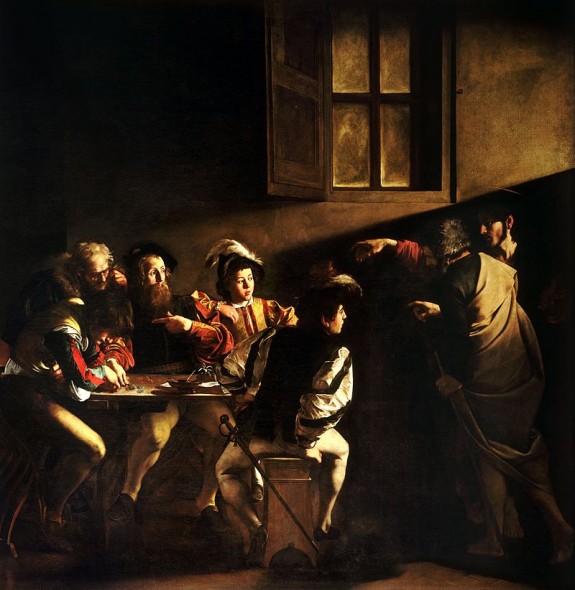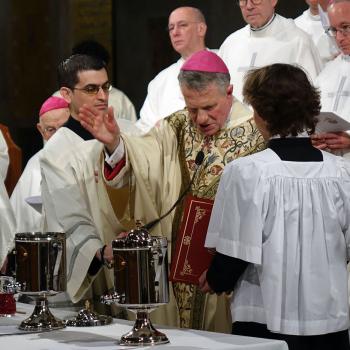“The Calling of St. Matthew” by Caravaggio (1599-1600) via Wikipedia
My friend Fr. Scott Hurd in Washington spotted this reference in one of Pope Francis’s talks in Manila and was startled. He’d never heard mention of a spouse of the evangelist:
Think of St Matthew. He was a good banker. But he let people down because he imposed taxes against his own people to give to the Romans. He was full of money. Jesus passed by, looked at him and said: “Follow me”. He couldn’t believe it. It you have the opportunity, see Caravaggio’s picture of him. Jesus calls him and those around say: “Him? He betrayed us! He is no good! He hoards money!” But the surprise of being loved overcomes him. The day when Matthew left home for work, saying goodbye to his wife, he couldn’t imagine he would come home without money and have to prepare a feast for the one who loved him first. God surprised Matthew more than the money he had. Allow yourselves to be surprised by God. Don’t be afraid of surprises. They shake the ground beneath our feet and make us insecure, but they move us forward in the right direction.
Real love allows you to spend yourselves, to leave your pockets empty. Think of St Francis who died with empty hands and empty pockets but with a full heart. Remember: no young museums, and wise young people. To be wise use three languages: think well, feel well and do well. And to be wise allow yourselves to be surprised by the love of God. That will guarantee a good life.
That’s a new one to me, too. Anybody know anything more?
UPDATE: A couple of readers noted that ancient tradition holds all of the apostles were married, with the exception of St. John (even though this isn’t explicit in scripture.) But Fr. Hurd did a little digging and found his passage from something known as “The Acts and Martyrdom of St. Matthew.” This Gnostic text doesn’t mention Matthew’s wife, but it includes this fantastical passage, recounting how Matthew evidently “appointed” a king a priest, then named the king’s wife a priestess and his son a deacon:
And when he had thus communicated in fear and joy, the apostle appeared and said: “King Fulvanus, your name shall no longer be Fulvanus; but you shall be called Matthew. And you, the son of the king, shall no longer be called Fulvanus, but Matthew also; and you Ziphagia, the wife of the king, shall be called Sophia; and Erva, the wife of your son, shall be called Synesis. And these names of yours shall be written in the heavens, and there shall not fail of your loins from generation to generation.” And in that same hour Matthew appointed the king a presbyter, and he was thirty-seven years old; and the king’s son he appointed deacon, being seventeen years old; and the king’s wife he appointed a presbyteress; and his son’s wife he appointed a deaconess, and she also was seventeen years old. And then he thus blessed them, saying: The blessing and the grace of our Lord Jesus Christ shall be with you to time everlasting.
Then the king, having awakened out of sleep, and rejoiced with all his house at the vision of the holy Apostle Matthew, praised God.
















